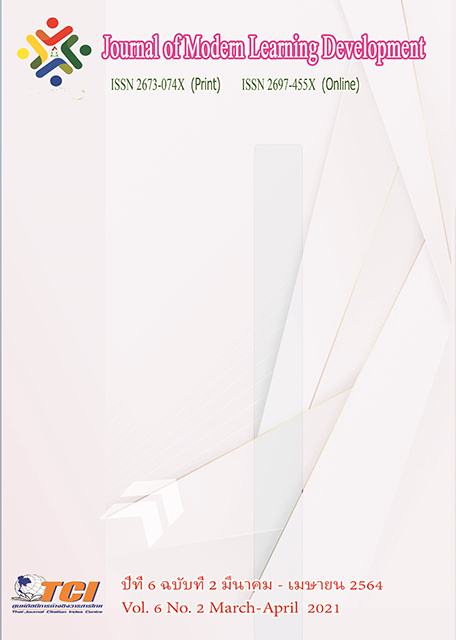Military and Politics in Thailand
Main Article Content
Abstract
This article aims to present the role of the military in politics in Thailand. From the past to the present to see the scope of roles, powers and duties of the military that are appropriate or not to interfere with politics. The military arose from the need for the community to protect the lives and property of its members. As the community grew, the population increased. Own territory the military has also been developed in terms of personnel organization. Organization of the army procession war planning weapon schemes as well as methods of conducting battle since the sukhothai establishment until the rattanakosin period thai military has always been an important state affair. Since there has been a constant war in ancient times, all able-bodied men had military service duties. Especially in times of war military and civilians were therefore not separated as they are today. Even organizing the bureaucracy itself will have the position of Somsuai and Somuhrakhom is the highest head in public administration but manpower control and the use of manpower in the military not completely separated from each other significant military improvements began during the reign of king chulalongkorn. Which has announced military management in the year 2430 to be a western style and later in the year 2435 has been established the ministry of defense. The military has therefore played a very prominent role in thai politics. Because the military is institutionally ready as well as the strength of ideology and concept but the military continued to fight for power. This reflects the weakness and instability of the military institution. This contradicts Huntington professional military concept that professional soldiers do not get involved in politics. Because professional military service is what will keep the military from interfering in politics.
Article Details
References
เกษมชาติ นเรศเสนีย์. (2538). การศึกษาเปรียบเทียบความนึกคิด อุดมการณ์ ทัศนคติ และพฤติกรรมทางการเมือง ของนายทหารนักเรียนโรงเรียนเสนาธิการทหารบก หลักสูตรหลักประจำชุดที่ 73 และนักศึกษาวิทยาลัยการทัพบก ชุดที่ 40. กรุงเทพฯ : โรงเรียนเสนาธิการทหารบก.
กนลา สุขพานิช และวุฒิชัย มูลศิลป์. (2523). ข้อคิดและแนวทางในการศึกษาบทบาทของทหารในการเมือง. กรุงเทพฯ: แสงรุ้งการพิมพ์.
ณัชชาภัทร อุ่นตรงจิตร. (2553). ข้อเสนอใหม่ของการศึกษาบทบาทของทหาร กับความขัดแย้งทางการเมือง. วารสารสถาบันพระปกเกล้า. 8(1), 69-86.
ธีรยุทธ บุญมี. (2550). ความคิดสองทศวรรษวิเคราะห์แนวโน้มการเมืองไทย. กรุงเทพฯ: มติชน.
นราวดี เกิดจงรักษ์. (2559). การแทรกแซงของทหารและการทำให้เป็นประชาธิปไตยในไทยและอินโดนีเซีย. ดุษฎีนิพนธ์หลักสูตรปริญญา ปรัชญาดุษฎีบัณฑิต (การเมือง). กรุงเทพฯ : มหาวิทยาลัยรามคำแหง.
ปริญญา อุดมทรัพย์. (2514). วิเคราะห์บทบาททางการเมืองของทหารในประเทศไทย. วิทยานิพนธ์รัฐศาสตรมหาบัณฑิต. กรุงเทพฯ จุฬาลงกรณ์มหาวิทยาลัย.
วชิรวัชร งามละม่อม, (2559). รัฐประหาร บทบาททหารกับการเมืองในประเทศไทย, สืบค้นเมื่อ วันที่ 20 กุมภาพันธ์ 2563. จาก http://www.lib.ku.ac.th/KUCONF/2560/KC5410008.pdf
สุจิต บุญบงการ. (2543). ปัญหาพัฒนาการทางการเมืองไทย. นนทบุรี : มหาวิทยาลัยสุโขทัยธรรมาธิราช.
สุจิต บุญบงการ. (2549). บทบาทกองทัพในเอเชียตะวันออกเฉียงใต้หลังการสิ้นสุดของสงครามเย็น. กรุงเทพฯ: สำนักงานกองทุนสนับสนุนการวิจัย.
สุรชาติ บำรุงสุข. (2558). เสนาธิปไตย: รัฐประหารกับการเมืองไทย. กรุงเทพฯ: สำนักพิมพ์มติชน.
Claude E. Welch and Arthur K. Smith. (1974). Military Role and Rule: Perspectives on Civil Military Relations. Mas: Dexbury Press.
Daniel Lerner. (1968). The Passing Traditional Society: Modernizing the Middle East. New York: The Free Press.
Egil Fossum. (1967). The Military in Latin American Politics. MA thesis Department of Political Science. University of Oslo.
Janowitz, Moris. (1960). The Professional Soldier: A Social and Political Portrait Glencoe. Chicago: The University of Chicago Press.
Samuel E. Finer. (1962). The Man on Horseback: The Role of The Military in Politics. New York: Praeger.
Samuel P. Huntington. (1957). The soldier and the state: The theory and politics of civil-military relations. New York: Vintage.
Samuel P. Huntington. (1968). Political Order in Changing Societies. New Haven and London: Yale University Press.


